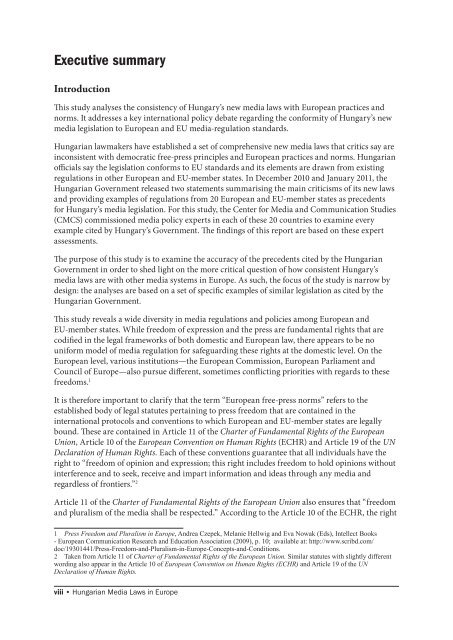An Assessment of the Consistency of Hungary's Media Laws with ...
An Assessment of the Consistency of Hungary's Media Laws with ...
An Assessment of the Consistency of Hungary's Media Laws with ...
Create successful ePaper yourself
Turn your PDF publications into a flip-book with our unique Google optimized e-Paper software.
Executive summary<br />
Introduction<br />
This study analyses <strong>the</strong> consistency <strong>of</strong> Hungary’s new media laws <strong>with</strong> European practices and<br />
norms. it addresses a key international policy debate regarding <strong>the</strong> conformity <strong>of</strong> Hungary’s new<br />
media legislation to European and EU media-regulation standards.<br />
Hungarian lawmakers have established a set <strong>of</strong> comprehensive new media laws that critics say are<br />
inconsistent <strong>with</strong> democratic free-press principles and European practices and norms. Hungarian<br />
<strong>of</strong>ficials say <strong>the</strong> legislation conforms to EU standards and its elements are drawn from existing<br />
regulations in o<strong>the</strong>r European and EU-member states. in December 2010 and January 2011, <strong>the</strong><br />
Hungarian government released two statements summarising <strong>the</strong> main criticisms <strong>of</strong> its new laws<br />
and providing examples <strong>of</strong> regulations from 20 European and EU-member states as precedents<br />
for Hungary’s media legislation. For this study, <strong>the</strong> Center for <strong>Media</strong> and Communication Studies<br />
(CMCS) commissioned media policy experts in each <strong>of</strong> <strong>the</strong>se 20 countries to examine every<br />
example cited by Hungary’s government. The findings <strong>of</strong> this report are based on <strong>the</strong>se expert<br />
assessments.<br />
The purpose <strong>of</strong> this study is to examine <strong>the</strong> accuracy <strong>of</strong> <strong>the</strong> precedents cited by <strong>the</strong> Hungarian<br />
government in order to shed light on <strong>the</strong> more critical question <strong>of</strong> how consistent Hungary’s<br />
media laws are <strong>with</strong> o<strong>the</strong>r media systems in Europe. As such, <strong>the</strong> focus <strong>of</strong> <strong>the</strong> study is narrow by<br />
design: <strong>the</strong> analyses are based on a set <strong>of</strong> specific examples <strong>of</strong> similar legislation as cited by <strong>the</strong><br />
Hungarian government.<br />
This study reveals a wide diversity in media regulations and policies among European and<br />
EU-member states. while freedom <strong>of</strong> expression and <strong>the</strong> press are fundamental rights that are<br />
codified in <strong>the</strong> legal frameworks <strong>of</strong> both domestic and European law, <strong>the</strong>re appears to be no<br />
uniform model <strong>of</strong> media regulation for safeguarding <strong>the</strong>se rights at <strong>the</strong> domestic level. On <strong>the</strong><br />
European level, various institutions—<strong>the</strong> European Commission, European Parliament and<br />
Council <strong>of</strong> Europe—also pursue different, sometimes conflicting priorities <strong>with</strong> regards to <strong>the</strong>se<br />
freedoms. 1<br />
it is <strong>the</strong>refore important to clarify that <strong>the</strong> term “European free-press norms” refers to <strong>the</strong><br />
established body <strong>of</strong> legal statutes pertaining to press freedom that are contained in <strong>the</strong><br />
international protocols and conventions to which European and EU-member states are legally<br />
bound. These are contained in Article 11 <strong>of</strong> <strong>the</strong> Charter <strong>of</strong> Fundamental Rights <strong>of</strong> <strong>the</strong> European<br />
Union, Article 10 <strong>of</strong> <strong>the</strong> European Convention on Human Rights (ECHr) and Article 19 <strong>of</strong> <strong>the</strong> UN<br />
Declaration <strong>of</strong> Human Rights. Each <strong>of</strong> <strong>the</strong>se conventions guarantee that all individuals have <strong>the</strong><br />
right to “freedom <strong>of</strong> opinion and expression; this right includes freedom to hold opinions <strong>with</strong>out<br />
interference and to seek, receive and impart information and ideas through any media and<br />
regardless <strong>of</strong> frontiers.” 2<br />
Article 11 <strong>of</strong> <strong>the</strong> Charter <strong>of</strong> Fundamental Rights <strong>of</strong> <strong>the</strong> European Union also ensures that “freedom<br />
and pluralism <strong>of</strong> <strong>the</strong> media shall be respected.” According to <strong>the</strong> Article 10 <strong>of</strong> <strong>the</strong> ECHr, <strong>the</strong> right<br />
1 Press Freedom and Pluralism in Europe, <strong>An</strong>drea Czepek, Melanie Hellwig and Eva Nowak (Eds), Intellect Books<br />
- European Communication Research and Education Association (2009), p. 10; available at: http://www.scribd.com/<br />
doc/19301441/Press-Freedom-and-Pluralism-in-Europe-Concepts-and-Conditions.<br />
2 Taken from Article 11 <strong>of</strong> Charter <strong>of</strong> Fundamental Rights <strong>of</strong> <strong>the</strong> European Union. Similar statutes <strong>with</strong> slightly different<br />
wording also appear in <strong>the</strong> Article 10 <strong>of</strong> European Convention on Human Rights (ECHR) and Article 19 <strong>of</strong> <strong>the</strong> UN<br />
Declaration <strong>of</strong> Human Rights.<br />
viii • Hungarian <strong>Media</strong> <strong>Laws</strong> in Europe

















